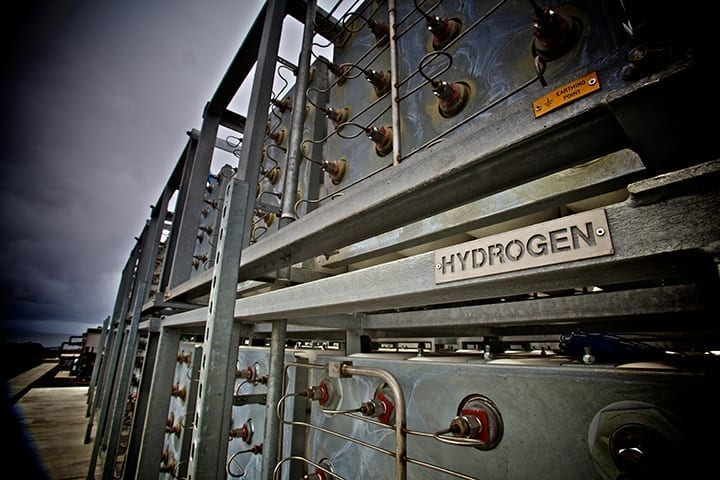Developers Make Progress on Solar-Powered Hydrogen Projects
Two projects focused on solar-powered hydrogen production made notable steps forward recently. One project, supported by Ricardo plc and the European Marine Energy Centre (EMEC), will investigate “using existing solar capacity to produce hydrogen as an alternative to high-carbon fossil fuels.” While the other, developed by HyperSolar Inc., will begin the manufacturing process for its first series of Gen 1 hydrogen panels.
Island Seeks to Reduce Fossil Fuel Use
The Ricardo/EMEC project follows on from work the two entities did assessing opportunities for hydrogen as a zero-carbon fuel for transport. The new solar-powered hydrogen production facility is being developed on the Isle of Wight (Figure 1)—an island off the south coast of England—using feasibility funding from the Rural Community Energy Fund. Wight Community Energy plans to test the viability of developing renewable energy solutions to support the local community and reduce environmental impact.

“The constraints of the Island’s electricity network mean that a radical approach is needed if we are to be successful in achieving a shift to 100 percent renewable energy, an ambition we share with the Isle of Wight Council,” Colin Palmer, spokesperson for Wight Community Energy, said in a statement. “We believe that developing hydrogen production while expanding our existing solar capacity could be a really promising avenue to explore and we are excited to progress these feasibility studies.”
The new hydrogen facility will be one of two community-led renewable energy schemes on the Isle of Wight. Both have the opportunity to not only significantly reduce the Isle of Wight’s demand for fossil fuel-based energy, but could also provide financial support to the community. Potential users of the hydrogen include ferry and bus companies, the rail network, commercial vehicles, and marine propulsion. Alternatively, hydrogen generated from surplus solar energy could be used as a means of energy storage (Figure 2).

“Hydrogen has the potential both to displace the use of fossil fuels with [a] cleaner and more environmentally friendly alternative, as well as offering a means of storing and buffering energy from renewable resources such as wind and solar,” said Colin McNaught, transport energy infrastructure manager with Ricardo.
Richard Ainsworth, manager with EMEC Hydrogen, the arm focused on hydrogen innovation and demonstration, said: “It’s great to see the learning from our green hydrogen demonstrator projects in Orkney benefitting islanded communities at the other end of the UK. Our hydrogen projects focus on the generation of hydrogen from renewable sources and the decarbonisation of lifeline island services such as ferries. EMEC is passionate about pushing for a decarbonised island cluster by 2030 and believe that green hydrogen has a key role to play in the net zero energy mix.”
‘Breakthrough Technology’ Ready for Demonstration
HyperSolar, meanwhile, said it has completed the last necessary tests on essential components, allowing it to begin manufacturing its Gen 1 hydrogen panels for demonstration. The design uses sunlight and water to produce hydrogen.
“Our biggest challenge for manufacturing was to replicate what we built in the lab in full scale manufacturing,” Tim Young, CEO of HyperSolar, said in a statement. “Our device is now fully tested and ready for production. We are working closely with our manufacturers to meet our milestone to produce 100 demonstration units.”
The company said it will also begin funneling greater resources into the development of Gen 2 technology. HyperSolar’s management team believes its nanotechnology solution to hydrogen production “can completely change the economics of hydrogen production and thus the global energy playing field.”
HyperSolar Chief Technology Officer Dr. Joun Lee said, “Our team is very pleased to have reached this crucial crossroad that puts us in a position to do what has not been done before—to venture out from the lab and put the hydrogen production panel into manufacturing. We are also very much looking forward to increasing our research effort on our Gen 2 panel, which will be three times more efficient.”
Hydrogen Strategy Part of ‘Green Transformation’
A “hydrogen economy” is being contemplated in many parts of the world. For example, on May 29, the Norwegian government proposed spending NOK 3.6 billion ($384 million) on a “green transformation” package. The investment objective is designed to underpin the country’s transition to cleaner energy and use it as the motor to overcome economic impacts of COVID-19. Hydrogen power solutions are part of the plan.
SINTEF, a European independent research organization, reported that Norway launched a hydrogen strategy subsequent to the proposal. “Norway’s investment into hydrogen and other green technologies is a good start, but more needs to be done. Urgently,” Nils Røkke, chairman of the board of the European Energy Research Alliance and executive vice president of Sustainability with SINTEF Energy, said.
Norway is following the path many other European countries are also taking, according to SINTEF. It said “implementing a hydrogen economy would decarbonize the economy and significantly improve Europe’s ability to reach climate goals.” But for hydrogen to be a low- or no-emission energy carrier, it must be produced with clean energy such as through electrolysis using renewable power. In that way, hydrogen can support the growth of intermittent renewable power and provide an option for storing large amounts of energy for longer periods of time.
“Hydrogen has exciting opportunities in store for Norway, both as an energy and a technology nation. We must seize the opportunity to support the transition towards an emission-free Europe,” said Røkke.
—Aaron Larson is POWER’s executive editor (@AaronL_Power, @POWERmagazine).